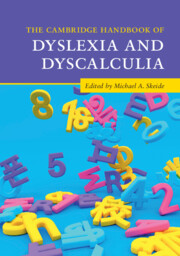Book contents
- The Cambridge Handbook of Dyslexia and Dyscalculia
- The Cambridge Handbook of Dyslexia and Dyscalculia
- Copyright page
- Contents
- Figures and Tables
- Contributors
- Acknowledgements
- General Introduction
- Part I Theoretical Frameworks and Computational Models
- Part II Cognitive Profiles and Behavioural Manifestations
- Part III Genetic and Environmental Influences
- Part IV Neurodevelopmental Foundations
- Part V Gender, Ethnicity, and Socioeconomic Background
- Part VI Cultural Unity and Diversity
- Part VII Early Prediction
- 17 Early Prediction of Learning Outcomes in Reading
- 18 Early Prediction of Learning Outcomes in Mathematics
- Summary: Early Prediction
- Part VIII Intervention and Compensation
- Part IX Best Practice – Diagnostics and Prevention
- Part X Best Practice – Schooling and Educational Policy
- General Summary
- References
- Index
- References
18 - Early Prediction of Learning Outcomes in Mathematics
from Part VII - Early Prediction
Published online by Cambridge University Press: 28 July 2022
- The Cambridge Handbook of Dyslexia and Dyscalculia
- The Cambridge Handbook of Dyslexia and Dyscalculia
- Copyright page
- Contents
- Figures and Tables
- Contributors
- Acknowledgements
- General Introduction
- Part I Theoretical Frameworks and Computational Models
- Part II Cognitive Profiles and Behavioural Manifestations
- Part III Genetic and Environmental Influences
- Part IV Neurodevelopmental Foundations
- Part V Gender, Ethnicity, and Socioeconomic Background
- Part VI Cultural Unity and Diversity
- Part VII Early Prediction
- 17 Early Prediction of Learning Outcomes in Reading
- 18 Early Prediction of Learning Outcomes in Mathematics
- Summary: Early Prediction
- Part VIII Intervention and Compensation
- Part IX Best Practice – Diagnostics and Prevention
- Part X Best Practice – Schooling and Educational Policy
- General Summary
- References
- Index
- References
Summary
Why do some children arrive in kindergarten already knowing how to add, while others struggle to count? Why do some students avoid challenging maths problems, while others embrace them? Given the importance of maths learning for academic success and future earning potential (e.g., Ritchie and Bates 2013), and the strong relation between school-entry maths skills and later maths achievement (Watts et al. 2014), it is critical to understand the sources of variability in maths knowledge in early childhood.
- Type
- Chapter
- Information
- The Cambridge Handbook of Dyslexia and Dyscalculia , pp. 318 - 332Publisher: Cambridge University PressPrint publication year: 2022

